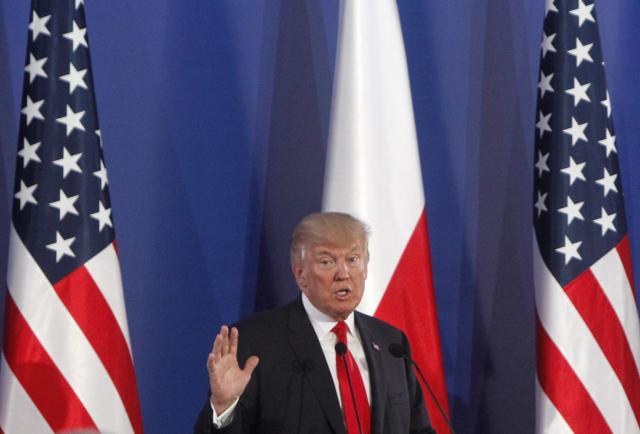Do Brexit and Trump spell end of Anglo-Saxon West?
Moving from Britain to the US, I find myself comparing the madness of the thing with the madness of the man
Timothy Garton Ash
'You must be from England,' says the shop assistant at the CVS drugstore in Menlo Park, California. When I mention President Donald Trump he says 'well, don't get me started on how things are going on your side of the Atlantic. Your Mrs May there in Downing Street is being [expletive deleted] by the bureaucrats in Brussels...
I can only agree. Having jumped from the Brexit frying pan into the Trump fire, I find myself comparing the two – and wondering which is worse. The transatlantic difference is, in the first place, between Britain's madness of the thing and America's madness of the man. Theresa May may be wooden, rigid and out of her depth, but compared to Trump she looks like Mother Teresa. It is the thing itself, Brexit, which is an act of collective madness and national self-harm. Every passing week brings new evidence of just how damaging it will be to almost every area of national life, and most of all to the 'left-behind' working class Brexit voters. They will be the ones worst hit by what is already a decline in real earnings.
Trump is one of the few well-known foreigners to have supported Brexit but, now he is holding hands with French president Emmanuel Macron rather than British Prime Minister May, even he has gone rather quiet on Brexit's expected glories. That does not mean he has become more restrained or responsible on any other subject. The man we saw in the campaign was a narcissistic, misogynistic, undisciplined, erratic bully. In his first six months as president he has lived down to all those epithets. As his director of communications for 10 days, Anthony Scaramucci, observed, you shouldn't expect a 71-year-old man to change.
He still cannot keep his Twitter zipper closed. His Twitter campaign against the well-known MSNBC television presenter Mika Brzezinski described her as 'low IQ Crazy Mika' and said she came 'to Mar-a-Lago 3 nights in a row around New Year's Eve, and insisted on joining me. She was bleeding badly from a face-lift. I said no!' That prompted the neoconservative commentator Bill Kristol to an eloquent counter-tweet: 'Dear @realDonaldTrump, You are a pig. Sincerely, Bill Kristol'. (I like that 'Sincerely'.) The transcript of Trump's recent interview with the 'failing' New York Times reveals the egocentric, superficial train-of-consciousness disorder of his mind: James Joyce's Leopold Bloom meets the National Enquirer. Asked if he will travel to Britain he says only 'Ah, they've asked me', and then reverts to telling stories about his trip to Paris. So much for the post-Brexit special relationship. Bouncing off a passing mention of visiting Napoleon's tomb, he produces my favourite line in the whole interview: 'Well, Napoleon finished a little bit bad'.
Most recently, he has been denouncing on Twitter his own attorney general, Jeff Sessions, almost as if one of his earliest prominent supporters were now a Clinton. Every day one wakes up and thinks 'how on earth can this trashy mountebank be President of the United States?' It is the character of the man which is the fundamental problem here, more than his ideology and policies, to the extent that one can detect any coherence in them. Surreally, there is now a serious discussion of whether the president is entitled to pardon himself.
Be it the madness of the man on one side of the Atlantic or the madness of the thing on the other, some of the symptoms are similar – as are some of the causes. The level of verbal vitriolage is almost unprecedented. Both Washington and London, capitals generally known for fairly stable and efficient government, are now witnessing an extraordinary confusion. Most senior positions in the State Department, for example, are still unfilled. Scaramucci accused Trump's chief of staff of leaking; that chief of staff departed; then Scaramucci himself got fired by the new chief of staff. British Cabinet ministers publicly contradict each other. On the Thames as on the Potomac, there are more leaks, gaffes and sudden reversals than in any theatrical farce.
Small wonder the German chancellor says continental Europeans can no longer rely on their traditional cross-Channel and transatlantic allies. Russia and China were laughing all the way to the G20 meeting in Hamburg, in advance of which China Daily had a front-page declaring that 'amid concerns about US protectionism and Brexit, China and Germany are expected to lead the charge for globalization and free trade'.
So is this the end of the West? Or at least, of the Anglo-Saxon West? I first heard the argument that the conjunction of Trump and Brexit marks a secular decline of the Anglo-Saxons from a former Finnish prime minister, and have heard it from several other observers since. The 19th century belonged to Britain, the 20th century (at least post-1945) to the United States. The neoliberalism which exercised a kind of global ideological dominance between the end of the Soviet Union in 1991 and the financial crisis of 2008 was a characteristic Anglo-Saxon product. It is itself the root cause of the genuine, widespread discontents which populists have exploited to gain power in both Britain and the United States. So the argument goes, not without some Schadenfreude – especially in France.
But be careful, chers amis, what you wish for. You may envisage a post-Anglo-Saxon 21st-century gloriously illuminated by the enlightened policies of Emanuel Macron and Justin Trudeau. Yet the Fortinbras who commands the stage after the self-destruction of the Anglo-Saxon Hamlet is more likely to have the face of a Xi Jinping, Vladimir Putin or Recep Tayyip Erdogan.
Anyway, this is a clear case of POI (Premature Overdramatic Interpretation), colloquially known as Pundit's Disease. Another future is still possible. Last summer, when I asked a very distinguished American political scientist how he would react to a Trump presidency, he said it would be a very interesting test of the American political system. When we resumed the conversation on the Stanford University campus last week, we agreed that thus far the constitutional checks and balances seem to be working. Courts have twice blocked Trump's travel ban. It is unthinkable that the independence of the judiciary could be existentially challenged here as it is currently being challenged in Poland. Armed with the great tradition of the First Amendment, the free press is doing exactly what the founding fathers intended it to do. The checks and balances are weaker in respect of foreign policy, but a Republican-dominated Congress has just passed legislation extending sanctions on Russia, North Korea and Iran – and deliberately making it more difficult for the president to lift them.
So long as Trump does not go to war with North Korea, or some equivalent folly, the United States could yet emerge from four years of a ghastly presidency with both its democracy and its international reputation battered, but not damaged beyond repair. British democracy, too, is working in its funny old parliamentary way, producing a real chance that we Brits can recover in time from the madness of the thing, to make either a very soft Brexit or – as we should – an exit from Brexit. And it's not as if those other countries have no problems of their own. So yes, the Anglo-Saxons are down, largely through their own grievous follies, but it's too soon to count them out.









